Oil operations in Iraq's Kurdish region are keeping pace despite miunting tensions between the local government and Baghdad, with Iraqi forces earlier this week occupying the strategic Kirkuk region, putting contracts in the region in jeopardy.
Dana Gas, based in Sharjah, issued a statement on the Abu Dhabi exchange yesterday affirming that operations and production in the Kurdish region were “proceeding as usual”.
"The company continues to supply gas to the power stations for production of electricity for the region. All of the employees of the company are on site and are carrying out their duties normally," Dana Gas said.
The sentiment was echoed yesterday by the UK's Genel Energy.
"Our operations in Kurdistan are progressing as normal – exports are continuing from Taq Taq and Tawke, payments are being received on time and operations are proceeding at both fields," said Murat Özgül, the company's chief executive
_______________
Read more:
KRG agrees $1bn payment to Dana Gas-led consortium to settle dispute
Baghdad claims victory in ousting Kurdish forces from disputed territories
_______________
The statements came the day after Russian oil firm signed a production-sharing agreement with the Kurdistan Regional Government worth up to US$400 million.
But analysts have questioned the future of such agreements, together with existing deals in the region struck by companies like Dana Gas, Genel and DNO, as tension in the region rises. The move by Iraqi forces to seize Kirkuk on Wednesday came three weeks after the Kurdish region voted overwhelmingly for independence from Baghdad in a controversial referendum condemned by Iraq and other countries.
Kurdish oil deals have historically been more favourable to foreign companies than those from Baghdad, but recent events could signal a regression, said Mustafa Ansari, energy economist at Arab Petroleum Investments Corporation (Apicorp).
"It's becoming unstable and there's a risk of lower or no exports," Mr Ansari said, pointing to Turkey's refusal of imports from the KRG. "It looks like a much more unattractive place to be at a time when the international oil companies are already reconsidering their position in Iraq."
The world's largest oil trader, Royal Dutch Shell, said last month that it would divest from Iraq's Majnoon oilfield to focus on its gas and petrochemicals projects in the country.
Baghdad’s control over the Kurdish region could work in the central government’s favour. If companies withdraw from the region, they could easily move into Iraqi fields as the government prepares 12 new options, said Mr Ansari.
“And given the Opec quota, any cuts in the KRG will be compensated with output from Iraq,” he said.
Yet the dispute may disinterest oil companies altogether, with risks outweighing rewards.
“From an investor perspective, Kurdistan looks less attractive than before. This is why the KRG is trying to make efforts to repay debt and maintain operations,” Mr Ansari said.
The KRG announced a $1bn settlement in August to end a long-running dispute with Dana Gas and its partners in the Pearl Consortium, finalising similar agreement with Genel and DNO the same month.
MrAnsari suggested that it was in Iraq’s interest to come to an agreement to enable the Kurdish region to produce and export, with ongoing instability reflecting on the wider country as well.
“At the end of the day, it isn’t in Iraq’s interest to render the KRG contracts moot,” he said.

